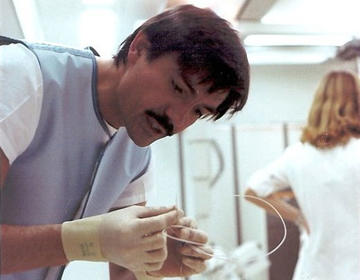15 Sep 2023
Celebrating the 2023 International Day of Interventional Cardiology
Nieves Gonzalo, EuroPCR Course Director, shares her thoughts upon the occasion of the International Day for Interventional Cardiology
We are proud to celebrate the International Day for Interventional Cardiology, established by a resolution of the United Nations in September 2022 to raise public awareness of cardiovascular diseases and procedures, related complications as well as prevention and care. The resolution notes that interventional cardio-angiology improves health, increases life expectancy and improves quality of life, and the importance of angioplasty as a life-saving procedure.
Significantly, this day is to be celebrated on 16 September every year, the date that Andreas Gruentzig carried out the first coronary angioplasty.
Interventional Cardiology has contributed significantly to improve care for patients suffering from cardiovascular diseases. The procedures we perform can save lives (such as primary angioplasty in STEMI) and improve quality of life for our patients. Further, the development of procedures that can be performed percutaneously has offered treatment for patients that previously did not have options because of a too high surgical risk. In this regard, percutaneous aortic valve implantation that started 20 years ago has offered a saving life strategy for thousands of patients.
Our specialty is characterized by its continuous and rapid development.
Since the first balloon angioplasty performed by Dr Gruentzig more than 30 years ago we have lived a continuous evolution initially in coronary interventions with the development of stents and drug eluting stents and then in valve interventions.
Other procedures to treat congenital diseases and prevent stroke have also shown a significant progress
In the near future, interventions to treat very frequent pathologies such as pulmonary embolism will probably increase significantly.

Andreas Gruentzig
To allow professionals to keep track of this continuous evolution, education is crucial. And this is the origin of PCR. The PCR mission is serving the needs of the patients by helping the cardiovascular community to share knowledge, experience and practice, and this is embodied in the PCR Companions initiative, which now represents 15,000 individual healthcare professionals.
With this objective, the course that started in Toulouse, EuroPCR, has evolved to a complete educational project that includes not only PCR courses in different parts of the world but also online resources such PCR Webinars that allow a continuous education and sharing platform for interventional cardiologists from all around the world.

We believe medical education should be patient centred, based on exchange and with a global perspective. The educational needs based on local epidemiology and resources can differ significantly in different parts of the world. In PCR, our goal is to improve education in interventional cardiology and make it more adapted to the needs of a global community.
An active collaboration with scientific societies across the world has allowed the development of joint sessions focused on topics of interest in different regions. Further, through initiatives such as “Stent save a life”, PCR has contributed to the implementation of life saving strategies such as primary PCI.
But still there is a lot to be done and we remain fully committed to continue accompanying interventional cardiologists from around the world in their educational journey, so as to fulfil our common mission of providing the best care for each individual patient.



